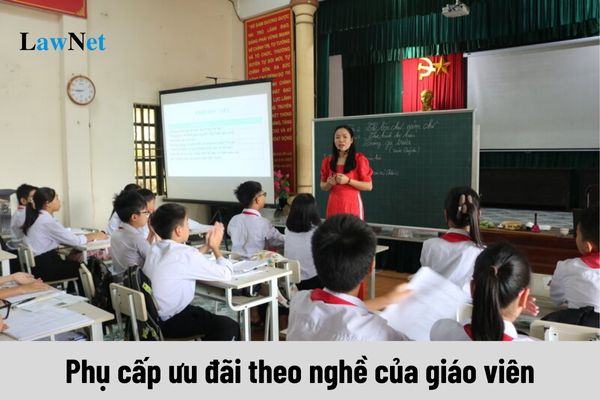Allowance rates for teachers working in areas with especially difficult economic conditions
What is the preferential allowance rate for teachers working in particularly difficult economic areas?
According to Article 11 of Decree 76/2019/ND-CP of Vietnam's Government, the occupational preferential allowance is specified as follows:
Occupational preferential allowance
The occupational preferential allowance is 70% of the current salary (according to the wage scale prescribed by competent authorities of the Communist Party and the State) plus the position allowance, seniority allowance (if any) applied to the actual working time in particularly difficult socio-economic areas of the subjects specified in Article 2 of this Decree, including:
1. Cadres, public employees, and workers who are teachers, education management public employees in educational institutions, vocational education institutions;
2. Cadres, public employees, and workers directly doing specialized health work in state health facilities including: commune-level health stations; agency health stations, school health stations; regional polyclinics; maternity homes, health centers, hospitals, and other health facilities from the commune level upwards;
3. Officers, professional military personnel, defense public employees, military medical staff directly doing specialized health work at military-civil health stations.
Thus, teachers working in particularly difficult socio-economic areas are entitled to an occupational preferential allowance of 70% of the current salary (according to the wage scale prescribed by the competent authorities of the Communist Party and the State) plus the position allowance, seniority allowance (if any) applied to the actual working time in particularly difficult socio-economic areas.

What is the preferential allowance rate for teachers working in particularly difficult economic areas? (Image from the Internet)
What is the actual working time used as the basis for calculating the occupational preferential allowance for teachers in particularly difficult economic areas?
According toClause 1, Article 13 of Decree 76/2019/ND-CP stipulated as follows:
Actual working time in particularly difficult socio-economic areas used as the basis for calculating allowances and subsidies policies
1. The actual working time in particularly difficult socio-economic areas is the total working time with compulsory social insurance contributions in particularly difficult socio-economic areas (if there is a break in time without receiving social insurance benefits, it will be accumulated), including:
a) Working time in agencies, organizations, public service providers of the Communist Party, the State, socio-political organizations;
b) Working time in the People's Army, the People's Public Security, and the cipher work.
...
Thus, the actual working time in particularly difficult socio-economic areas is the total working time with compulsory social insurance contributions in particularly difficult socio-economic areas (if there is a break in time without receiving social insurance benefits, it will be accumulated), including:
- Working time in agencies, organizations, public service providers of the Communist Party, the State, and socio-political organizations;
- Working time in the People's Army, the People's Public Security, and the cipher work.
What is the source of funds for paying the occupational preferential allowance?
According to Article 15 of Decree 76/2019/ND-CP stipulated as follows:
Funding sources and payment responsibilities
1. Funding sources:
a) For cadres and workers in agencies, organizations of the Communist Party, the State, socio-political organizations, and salaried individuals in the armed forces, the implementation of the policy prescribed in this Decree is ensured from the state budget according to the provisions of the State Budget Law and guiding documents;
b) For cadres and public employees, and workers in public service providers of the Communist Party, the State, socio-political organizations, the implementation of the policy prescribed in this Decree is ensured from the state budget and from the lawful revenues of public service providers (if any).
2. Payment responsibilities:
a) For the attraction allowance; the long-term working allowance in particularly difficult socio-economic areas; the occupational preferential allowance; allowances for purchasing and transporting clean, fresh water; travel expenses; allowances for visiting, learning, professional training, foreign language training; mobility allowances; and ethnic minority language teaching allowances for teachers, and educational management public employees working in particularly difficult socio-economic areas, the payment for the beneficiaries on the payroll of any agency, organization, or unit is done by that agency, organization, or unit;
b) For the initial allowance when receiving work in particularly difficult socio-economic areas, the receiving agency, organization, or unit will make the payment. In case of secondment, the sending agency, organization, or unit will make the payment;
c) For the one-time allowance when transferring work out of particularly difficult socio-economic areas or when retiring (or when the workplace is no longer considered particularly difficult socio-economic areas by competent authorities), the agency, organization, or unit on the payroll when the beneficiaries transfer work or when retiring (or when the workplace is no longer considered particularly difficult socio-economic areas by competent authorities) will make the payment.
Thus, the funding sources for paying the occupational preferential allowance come from:
- For officials and workers in agencies, organizations of the Communist Party, the State, socio-political organizations, and salaried individuals in the armed forces, the implementation of the policy prescribed in Decree 76/2019/ND-CP is ensured from the state budget according to the provisions of the State Budget Law 2015 and guiding documents;
- For officials and public employees, and workers in public service providers of the Communist Party, the State, and socio-political organizations, the implementation of the policy prescribed in Decree 76/2019/ND-CP is ensured from the state budget and from the lawful revenues of public service providers (if any).

